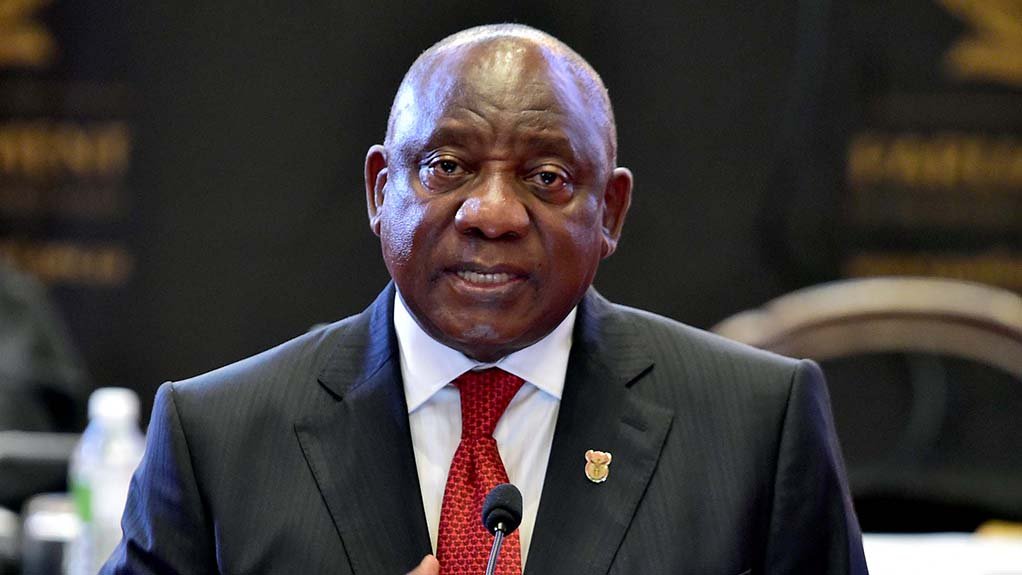President Cyril Ramaphosa says government will use all the levers at its disposal to cushion South Africans from the effects of rising fuel and food prices, including by speedily implementing possible changes arising from a review of the Basic Fuel Price (BFP) formula.
In an oral reply to a question posed by the Democratic Alliance leader John Steenhuisen in Parliament regarding government’s proposed response to increasing inflation, which is set to rise even more sharply following Russia’s invasion of Ukraine in late February, Ramaphosa acknowledged it to be a “major concern for us”.
The National Treasury has already warned that the inflation outlook for 2022 will be between 5% and 5.5%, rather than the 4.8% forecast in February, with the outcome dependent largely on the price of oil.
Secondary effects are anticipated to spill over into other parts of the economy, with a particular upside risk to food inflation, which is also likely to be impacted by increasing wheat prices given the important role that both Ukraine and Russia play in the international wheat market.
A Cabinet committee was deliberating on the options available to mitigate food and fuel price increases and consultations had also been initiated with labour, business, communities and traditional leaders.
Ramaphosa said that various mitigation options were being proposed and told Steenhuisen the recommendations he made during a supplementary question would also be considered.
Armed with various consumer products, including cooking oil and a tin of pilchards, the leader of the opposition said that government should consider “bringing down the fuel price to R16/litre by cutting out your levies, scrapping your sugar tax and immediately lifting value added tax on meat and chicken”.
Steenhuisen warned that South Africans face the prospect of a “tough winter” in light of approved electricity tariff increases, ongoing fuel price hikes and above-inflation rises in sugar, meat and vegetables.
The President said that the National Treasury and the Department of Mineral Resources and Energy (DMRE) were reviewing the BFP methodology, as well as other regulated components, to identify changes that could reduce the cost of fuel.
In a presentation made earlier in the week, it was reported that, in addition to the BFP review, the DMRE would undertake a review of the regulated margins determined through the regulatory accounting system (RAS).
Initial research has shown that changes to the RAS methodology components could reduce the petrol price by 85.82c/litre, while changes to the BFP methodology could add a further 18c/litre.
DMRE has also indicated that changes to the reference markets and the premium on the freight rate could reduce the price by about 3c/litre.
“This is work that's under way.
“These changes will be implemented as soon and as quickly as possible,” Ramaphosa pledged, while highlighting the decision made in the February Budget not to increase the general fuel levy on petrol and diesel for 2022/23.
Regulated levies make up more than 30% of the pump price and have been increasing at a pace higher than inflation since 2014.
SOUTH AFRICA’S UKRAINE STANCE
The National Treasury has warned that the severity of the impact of higher fuel prices on domestic inflation will ultimately be determined by the duration of the conflict in Ukraine and its impact on global supply chains and financial markets.
Ramaphosa attempted to use the platform created by the questions posed to him in the National Assembly to clarify South Africa’s stance on the conflict; a stance that has been heavily criticised largely for it lacking an outright condemnation of Russia’s attack on its democratic neighbour.
The President defended the decision to call for “dialogue, mediation and negotiation” based on South Africa’s own experience of using dialogue to overcome conflict, as well as government’s commitment to the United Nations Charter principle that states that members should settle international disputes by peaceful means.
He said South Africa had aligned itself with the United Nations secretary-general Antonio Guterres’ call for an immediate ceasefire and adherence to existing peace mechanisms to end the violence.
While continuing to refrain from describing the conflict as an invasion, Ramaphosa said “we support the principle that members should refrain from the threat of use of force against the territorial and political independence of other States”.
He confirmed that he had spoken with Russian President Vladimir Putin and said he also wanted to speak with Ukraine President Volodymyr Zelenskyy.
He also confirmed that South Africa would be willing to play a role in ending the conflict and repeated his earlier assertion that he had been approached to play a possible mediation role.
“We have said when called upon to do so, we would be ready to make a contribution, however minor that contribution would be.
“So we stand ready and we stand on the side of peace,” Ramaphosa said, while stressing that serious negotiations could only start once there was a ceasefire.
EMAIL THIS ARTICLE SAVE THIS ARTICLE ARTICLE ENQUIRY
To subscribe email subscriptions@creamermedia.co.za or click here
To advertise email advertising@creamermedia.co.za or click here











